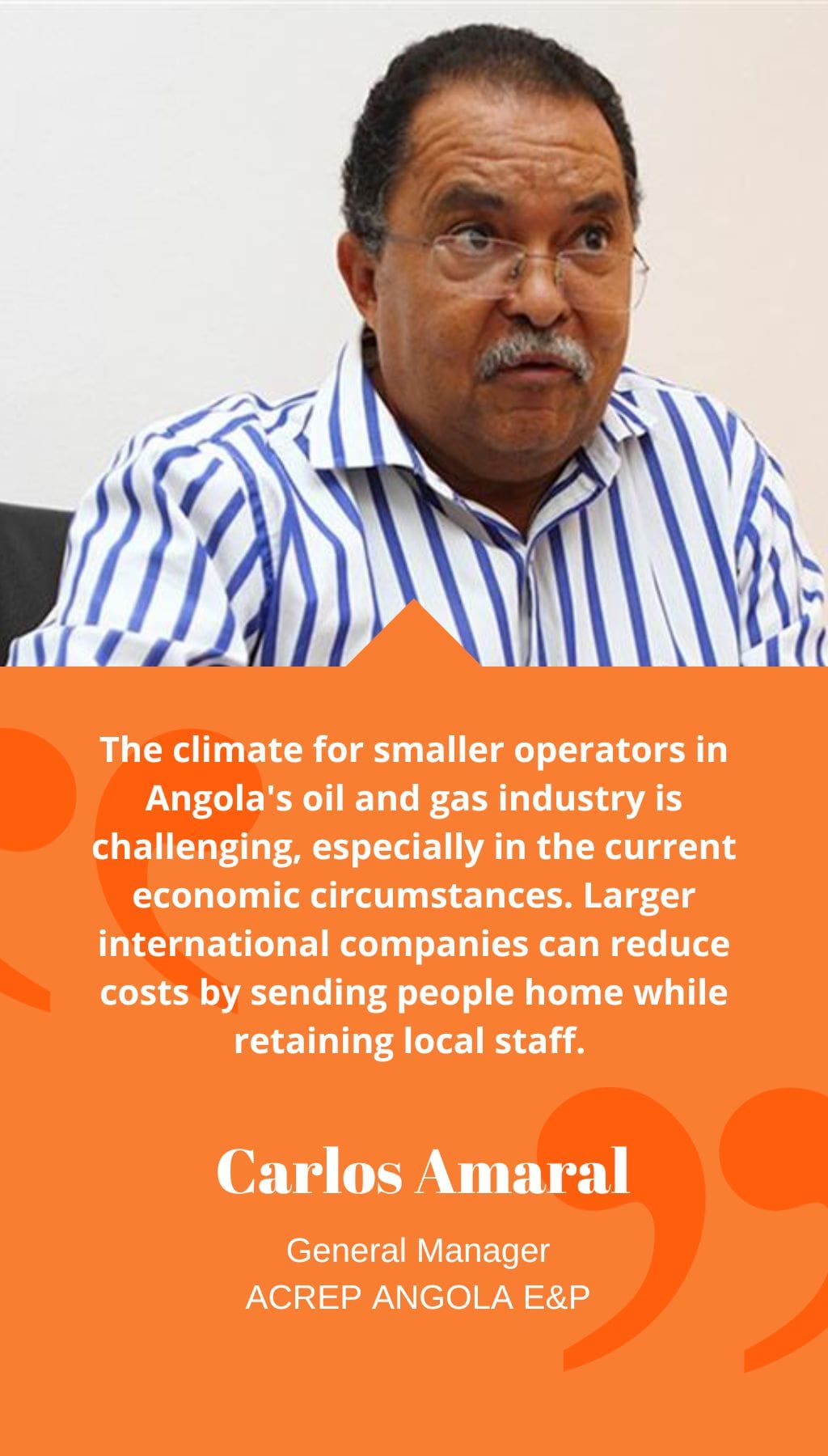
- Angola | 12 November 2020

To what extent has COVID-19 impacted Acrep Angola E&P?
The impact of COVID-19 on Acrep’s operations has been quite significant. Since February, we have been working remotely, which has its limitations. While online communication allows for effective collaboration, we miss the nuances of in-person interactions, especially in the business context. The pandemic has also caused delays in our projects as international service providers are unable to travel to Angola. We had three developments scheduled to start in late 2020, but they have been postponed for at least six months. Additionally, the oil price experienced a decline, although it has recently stabilized around US$40 per barrel in August.
COVID-19 has also changed the way major companies operate, with remote work becoming the preferred option. Workforces may not return to their previous capacity, as seen with Equinor, the third or fourth biggest producer in Angola, which now operates with just seven people in their operating office.
Can you provide an update on Acrep’s operations in Angola?
Certainly. We have recently signed a deal to join Block 1/14 as a partner with ENI as the operator, along with Equinor and Sonangol P&P. This block holds promising potential, and the participation of two major companies is a positive development for Acrep. In addition, we have two developments in the pipeline for Block 4/05, although they have experienced delays. For Block 17, with Total as the operator, we have two or three interesting developments that we aim to bring on-stream in the next three to four years. The shallow area at Block 2 has also been delayed but remains on budget. In Cabinda North, we have confirmed some reserves in an onshore field, which is interesting for a junior company like ours, although it may not reach the scale for major companies. While the development of this asset is not feasible in Angola due to the high costs of drilling and operating, it still holds value as a 200 million barrel STOOIP reserves field.
How do you view the climate for smaller operators in Angola’s oil and gas industry?
The climate for smaller operators in Angola’s oil and gas industry is challenging, especially in the current economic circumstances. Larger international companies can reduce costs by sending people home while retaining local staff. However, for local companies like Acrep, the costs involved pose difficulties. For example, the entry fee to acquire data in the agency data room for onshore blocks is set at a minimum of US$1 million, compared to just US$50,000 in Nigeria for similar data. This high cost, coupled with the lack of reserves and limited financing options from banks, creates hurdles for smaller operators. Additionally, major companies are unlikely to invest in new projects in the coming years. While onshore holds potential, the current approach needs to change. Smaller companies should be given access and time to explore new discoveries instead of relying on old and expensive data.
Which measures do you think the government should focus on to help revive Angola’s onshore oil production?
To revive Angola’s onshore oil production, the government should adopt certain measures. Firstly, the data for onshore exploration should be made quasi-free or significantly reduced in cost. This would attract more interest and participation from operators. Secondly, the government should follow the successful models of countries like Timor-Leste and Namibia, where recognized companies are allowed to apply for exploration licenses in a wider variety of locations and create their own data. Moreover, the high costs involved in onshore exploration need to be addressed. For instance, Acrep has participated in the drilling of three shallow wells in Cabinda over the last three years, which cost a total of US$90 million. With the oil prices observed since 2015, such high costs are not sustainable for onshore exploration. In light of the economic constraints imposed by the pandemic, companies willing to bring drill rigs for exploration should be encouraged, especially in areas that have been closed for decades and hold the potential for successful operations.
Where would you like to see Acrep E&P in the next two years, and what would you like to achieve in that timeline?
In the next two years, we have several goals for Acrep Angola E&P. Progress at Block 1/14 is a significant focus for us, and we look forward to developing it alongside our partners. We also aim to be more involved in onshore operations, but this requires governmental reforms to make it more attractive for all operators. Additionally, we intend to sell some assets to focus on higher potential projects and increase profit margins.
Furthermore, Acrep Angola E&P plans to list on the Angola Stock Exchange and Derivatives within the next two years. This step aims to raise the profile of our company and increase visibility. With our track record of participating in 16 exploration wells and achieving a 45% success rate, which is high in the industry, and over 15 years of being a trusted partner to international and local oil companies, we believe listing on the exchange will bring valuable opportunities. Despite the challenges brought on by the oil crash and the pandemic, we remain resilient and possess valuable local knowledge and experience, which we are determined to leverage for future success.














